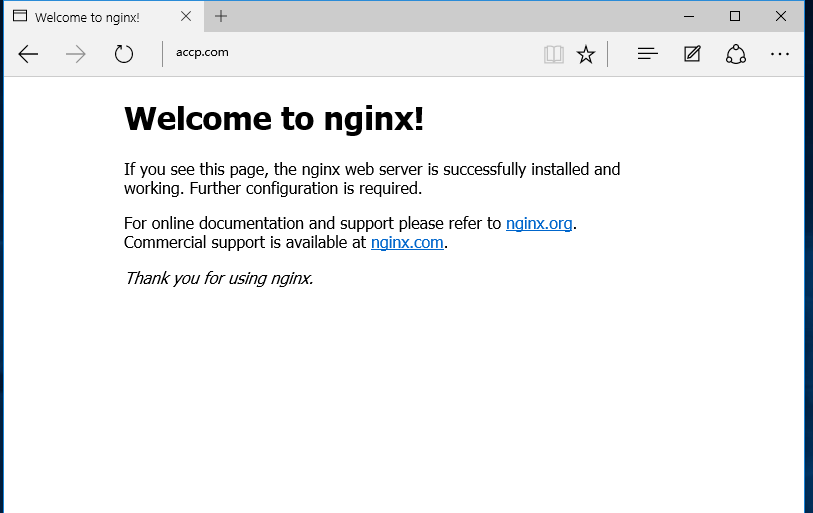Application example 1. Domain name based jump
Now the old domain name www.old.com of the company needs to be replaced by the new domain name www.new.com, but the old domain name can not be abolished, and it needs to jump to the new domain name, and the later parameters remain unchanged.
1. Install Nginx service
[root @ localhost ~] ා RPM - uvh http://nginx.org/packages/centos/7/noarch/rpms/nginx-release-centos-7-0.el7.ngx.noarch.rpm / / install nginx official source
Warning / var/tmp/rpm-tmp.vS0k20: header V4 RSA/SHA1 Signature, key ID 7bd9bf62: NOKEY
In the preparation, we should be more serious in the party and the people and the people and the people and the people and the people and the people and the people and the people and the people and the people and the people and the people and the people and the people and the people and the people and the people and the people and the people and the people and the people and the people and the people and the people and the people and the people and the people and the people and the people and the people and the people and the people and the people and the people and the people and the people and the people and the people and the people and the people and the people and the people and the people and the people and the people and the people and the people and the people and the people and the people and the people and the people and the people and the people and the people and the people and the people and the people and the people and the people and the people and the people and the people[100%]
Upgrading / installing
1:nginx-release-centos-7-0.el7.ngx ################################# [100%]
[root @ localhost ~] (Yum install nginx - Y / / Yum install nginx2. Modify the Nginx configuration file
[root@localhost ~]# vim /etc/nginx/conf.d/default.conf / / modify the default configuration file
server {
listen 80;
server_name www.accp.com; //Modify host name
#charset koi8-r;
access_log /var/log/nginx/www.accp.com-access.log main; //Turn on log service3. Install DNS domain name resolution service
[root@localhost ~]# yum install bind -y
4. Modify the main configuration file
[root@localhost ~]# vim /etc/named.conf
options {
listen-on port 53 { any; }; //Listen to all addresses
listen-on-v6 port 53 { ::1; };
directory "/var/named";
dump-file "/var/named/data/cache_dump.db";
statistics-file "/var/named/data/named_stats.txt";
memstatistics-file "/var/named/data/named_mem_stats.txt";
recursing-file "/var/named/data/named.recursing";
secroots-file "/var/named/data/named.secroots";
allow-query { any; }; //Allow all5. Modify the regional configuration file
[root@localhost ~]# vim /etc/named.rfc1912.zones / / configure the zone configuration file
zone "accp.com" IN {
type master;
file "accp.com.zone";
allow-update { none; };
};6. Modify regional data configuration file
[root@localhost ~]# cd /var/named/
[root@localhost named]# cp -p named.localhost accp.com.zone
//Copy zone data profile template
[root@localhost named]# vim accp.com.zone / / modify the zone configuration file
$TTL 1D
@ IN SOA @ rname.invalid. (
1D ; refresh
1H ; retry
1W ; expire
3H ) ; minimum
NS @
A 127.0.0.1
www IN A 192.168.131.133 //Local address [root @ localhost named] ා systemctl start named / / start dns Service
[root@localhost named]# systemctl stop firewalld.service / / turn off the firewall
[root@localhost named]# setenforce 0
[root@localhost named]# systemctl start nginx / / start nginx service
[root@localhost named]# netstat -ntap | grep nginx / / view the port
tcp 0 0 0.0.0.0:80 0.0.0.0:* LISTEN 4093/nginx: master 7. Set the dns resolution address of the test machine as the virtual machine address, and use the test machine to test the web page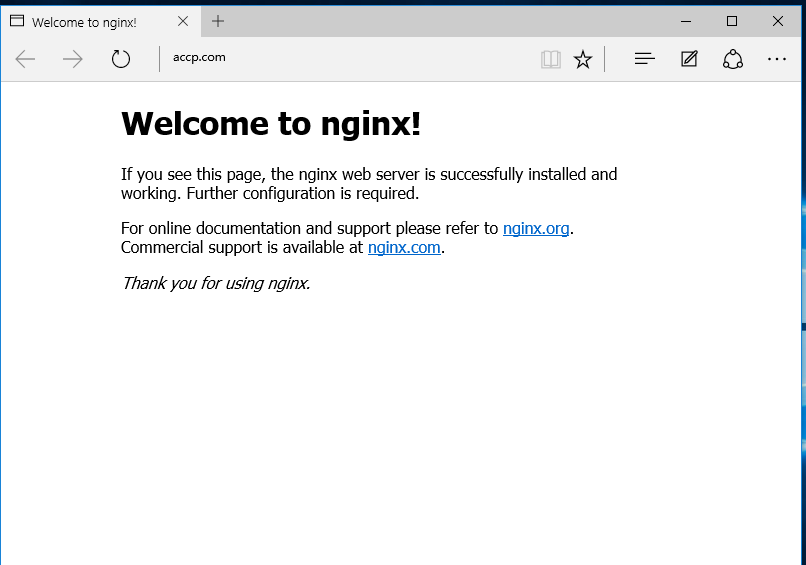
8. Modify the configuration file and set the domain name jump
[root@localhost named]# vim /etc/nginx/conf.d/default.conf ##Modify profile
server {
listen 80;
server_name www.old.com;
#charset koi8-r;
access_log /var/log/nginx/www.old.com-access.log main;
location / {
if ($host = "www.old.com"){ //Match if it is an old domain name
rewrite ^/(.*)$ http://www.new.com/ permanent; / / to permanently set the jump to the new domain name
}
root /usr/share/nginx/html;
index index.html index.htm;
}9. Add new domain name resolution in DNS configuration file
[root@localhost named]# vim /etc/named.rfc1912.zones
zone "kgc.com" IN {
type master;
file "kgc.com.zone";
allow-update { none; };
};
[root@localhost named]# cp -p /var/named/accp.com.zone /var/named/kgc.com.zone
//Copy the original regional data profile to the regional data profile of kgc.com
[root@localhost named]# systemctl restart named / / restart dns resolution service
[root@localhost named]# systemctl restart nginx / / restart nginx service10. Visit with the old domain name to check whether the web page jumps to the new domain name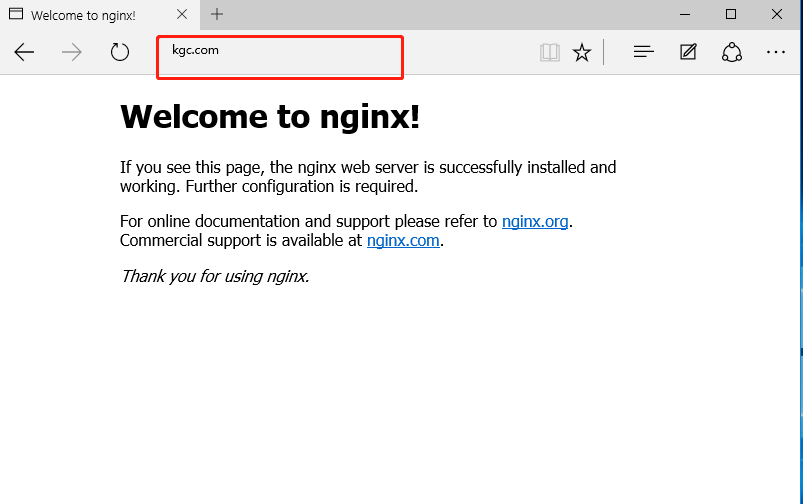
11. Add parameters after the old domain name to check whether there are still parameters when jumping to the new domain name
Application example 2. IP access jump based on client
For example, when the company's business version goes online today, a fixed maintenance page will be displayed for all IP accesses. Only the company's IP: 192.168.131.128 accesses normally.
1. Modify the default configuration file
[root@localhost ~]# cd /etc/nginx/conf.d/
[root@localhost conf.d]# vim default.conf
server {
listen 80;
server_name www.accp.com;
#charset koi8-r;
access_log /var/log/nginx/www.accp.com-access.log main;
//Set whether to allow access to the IP flag
set $rewrite true; //Set variable to true
//Determine whether it is the IP allowed to access
if ($remote_addr = "192.168.131.128"){
set $rewrite false; //Match the legal IP, set the variable to false, and jump to the page normally
}
//The IP that is not allowed to be accessed is marked for judgment
if ($rewrite = true){ //Match illegal IP, jump to maintenance page
rewrite (.+) /main.html;
}
#Match tags to jump to site
location = /main.html { //Exact matching
root /usr/share/nginx/html; //Site path
}
location / {
root /usr/share/nginx/html;
index index.html index.htm;
} 2. Create IP sites that are not allowed to visit and maintain web pages
[root@localhost conf.d]# cd /usr/share/nginx/html / / / switch to the site [root@localhost html]# vim main.html / / edit the content of the illegal IP page <h1>this is test web</h1> [root@localhost html]# systemctl restart nginx / / restart Nginx service
3. Use the pop-up page when IP access is not allowed
4. Pages that can be accessed during legal IP access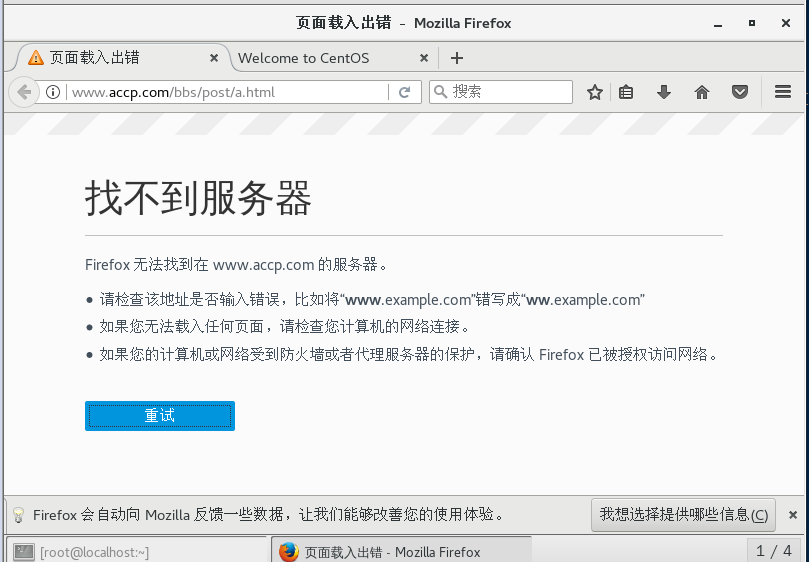
Application example 3. Jump to the new domain name and add directory based on the old domain name
For example, what I'm visiting now is http://bbs.accp.com , now you need to jump to http://www.accp.com/bbs , note to keep the parameters after domain name jump unchanged.
1. Modify the Nginx default configuration file
[root@localhost ~]# cd /etc/nginx/conf.d/
[root@localhost conf.d]# vim default.conf / / modify the default configuration file
server {
listen 80;
server_name bbs.accp.com; //Modify service name
#charset koi8-r;
access_log /var/log/nginx/www.accp.com-access.log main;
location /post { //Match post directory with location
rewrite (.+) http://www.accp.com/bbs permanent; / / redirect jump permanently
}2. Modify the region data configuration file accp.com.zone of dns
[root@localhost conf.d]# cd /var/named/
[root@localhost named]# vim accp.com.zone / / modify the zone data configuration file
$TTL 1D
@ IN SOA @ rname.invalid. (
0 ; serial
1D ; refresh
1H ; retry
1W ; expire
3H ) ; minimum
NS @
A 127.0.0.1
bbs IN A 192.168.131.133
[root@localhost named]# systemctl restart named / / restart dns domain name resolution service
[root@localhost named]# systemctl restart nginx / / restart Nginx service
[root@localhost named]# echo "nameserver 192.168.13.144" > /etc/resolv.conf
//Place the resolution server address in the local resolution configuration fileEntering the post directory and parameters will jump to bbs and the parameters after it. Because of the version problem of the browser, the parameters behind the domain name cannot be displayed here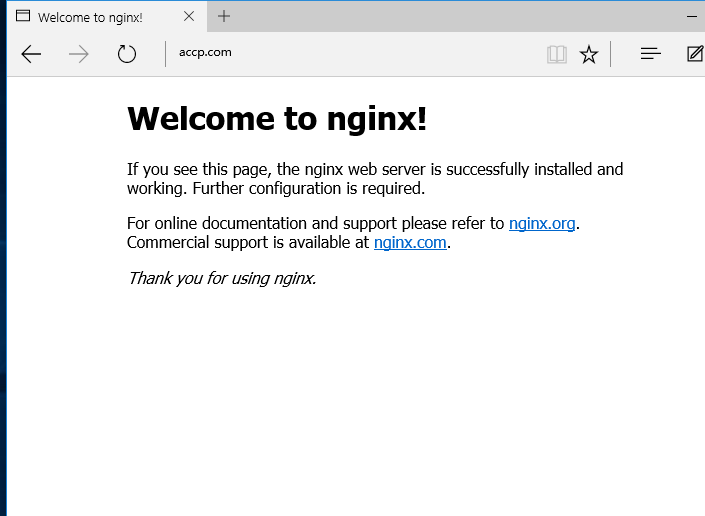
Application example 4. Jump based on parameter matching
For example, visit now http://www.accp.com/100-(100|200)-100.html Jump to http://www.accp.com Page.
1. Modify the default configuration file
[root@localhost ~]# cd /etc/nginx/conf.d/
[root@localhost conf.d]# vim default.conf
server {
listen 80;
server_name www.accp.com;
#charset koi8-r;
access_log /var/log/nginx/www.accp.com-access.log main;
if ($request_uri ~ ^/100-(100|200)-(\d+).html$){
##Match the integer html whose regular start is 100 - (100| 200) - multiple times at a time
rewrite (.*) http://www.accp.com permanent; redirect to home page permanently
}2. Modify the region data configuration file accp.com.zone of dns
[root@localhost conf.d]# vim /var/named/accp.com.zone / / modify the zone data configuration file www IN A 192.168.131.133 [root@localhost conf.d]# systemctl restart named / / restart dns domain name resolution service [root@localhost conf.d]# systemctl restart nginx / / restart Nginx service
Enter 100-100-99.html to jump to accp Homepage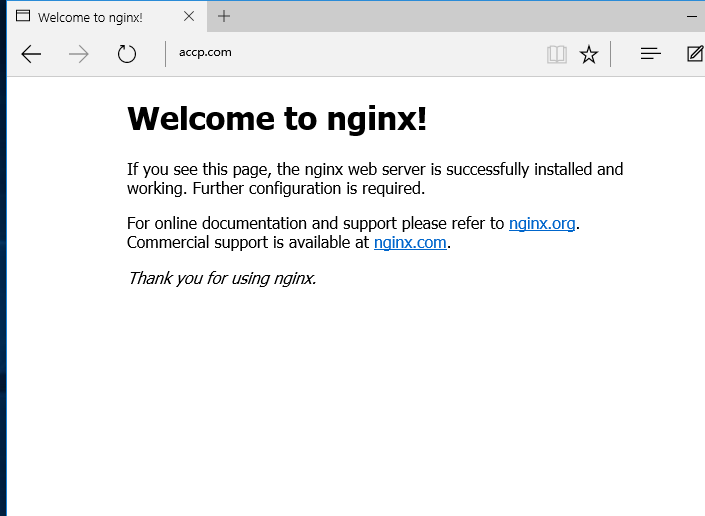
Application example 5. Jump based on all php ending files in the directory
Visit http://www.accp.com/upload/1.php Jump to home
Modify Nginx default profile
[root@localhost ~]# cd /etc/nginx/conf.d/
[root@localhost conf.d]# vim default.conf / / modify the default configuration file
server {
listen 80;
server_name www.accp.com;
#charset koi8-r;
access_log /var/log/nginx/www.accp.com-access.log main;
location ~* /upload/.*\.php$ { //Match is not case sensitive. Match zero or more times after upload with. php as the end
rewrite (.+) http://www.accp.com permanent; / / go to the homepage
}
[root@localhost conf.d]# systemctl restart nginx / / restart Nginx serviceVisit the page / upload / ending in. php to jump to the accp Homepage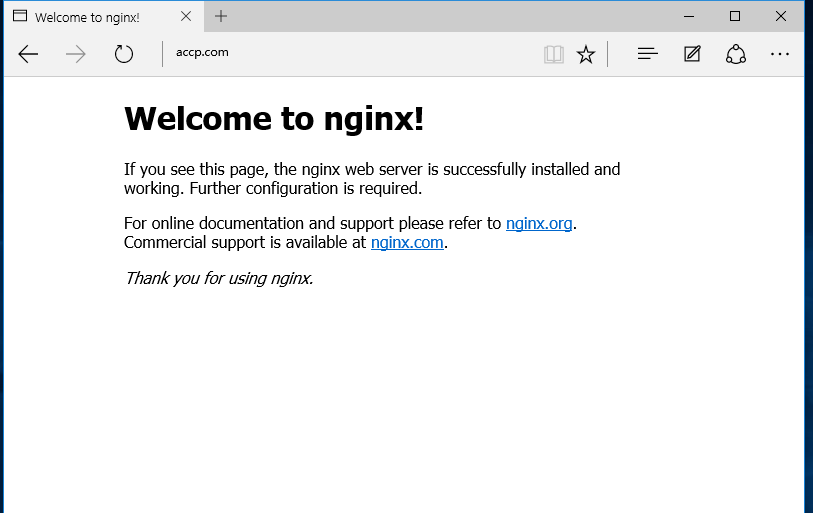
Application example 6. Jump based on the most common url request
Visit a specific page and jump to the homepage
Modify Nginx default profile
[root@localhost ~]# cd /etc/nginx/conf.d/
[root@localhost conf.d]# vim default.conf / / modify the Nginx default configuration file
server {
listen 80;
server_name www.accp.com;
#charset koi8-r;
access_log /var/log/nginx/www.accp.com-access.log main;
location ~* ^/abc/123.html { //Match a specific web page
rewrite (.+) http://www.accp.com permanent; / / go to the homepage
}
[root@localhost conf.d]# systemctl restart nginx / / restart Nginx serviceVisit a specific web page to jump back to the accp home page